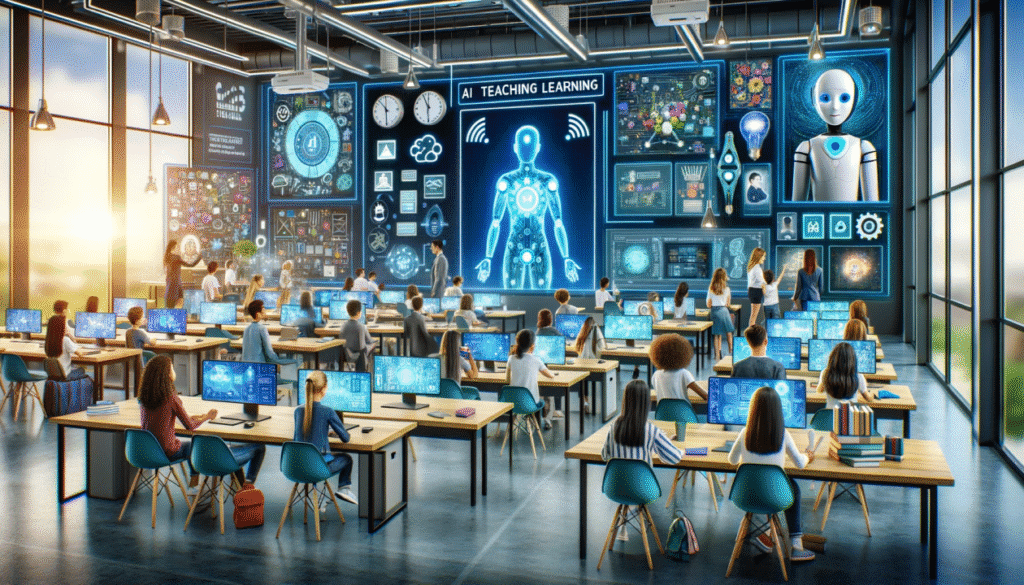Championing Artificial Intelligence in the Classroom
At the Sharjah International Education Conference (SIEC) 2025, a major event uniting education leaders, policymakers, and innovation pioneers, Dr. Susan Mumm, Chancellor of the American University of Sharjah (AUS), took center stage with a compelling keynote. Her address sent a powerful message about the indispensable role Artificial Intelligence (AI) must play in the future of education—not in the distant future, but now.
Dr. Mumm’s speech delivered a futuristic yet grounded vision, placing AI not just as a technology of convenience but as a catalyst for transformation. “We are no longer preparing students for the future—we are preparing them for the now,” she began. “AI is not a concept; it is a present reality. And the institutions that thrive will be those that understand this shift and lead with agility and purpose.”
Her address resonated across the conference halls, urging attendees to embrace technology not just as a tool, but as an integral part of modern pedagogy, planning, and student development. With countries and universities racing to innovate, the AUS Chancellor positioned Sharjah as a thought leader in academic excellence and future-ready strategies.

Revolutionizing the Learning Experience Through AI
One of the strongest points in Dr. Mumm’s keynote was the redefinition of learning through personalization. She emphasized that AI has the power to revolutionize the way students engage with educational content, ensuring that no two learning experiences are the same.
With adaptive learning platforms, intelligent tutoring systems, and real-time performance tracking, AI enables tailored learning journeys. Students who struggle in certain areas can receive targeted interventions, while high-achievers can be challenged beyond the standard curriculum. “This is not just innovation—it is inclusion,” Dr. Mumm noted. “AI empowers every learner to move at their own pace and achieve their potential.”

She further explained how AI-based diagnostics can identify gaps in comprehension early, preventing long-term setbacks. This ensures students are not left behind, and teachers can respond with focused attention rather than blanket instruction.

Freeing Educators to Inspire
While celebrating AI’s capabilities, Dr. Mumm made an emphatic point: AI will not replace teachers—it will empower them. “AI is not here to take over our classrooms. It is here to support the incredible work that educators already do,” she explained.
By automating time-consuming tasks such as grading, administrative reporting, and data analysis, AI frees educators to focus on more critical aspects of teaching—mentorship, curriculum development, and personal engagement. “We want our teachers to be innovators, not administrators,” she said, highlighting how technology should amplify human creativity, not replace it.
Furthermore, Dr. Mumm pointed out that educators must also be trained and supported in using AI effectively. This means professional development programs must evolve, giving teachers confidence to adopt and adapt new tools without fear.
A Curriculum Built for an AI Future
Another pillar of Dr. Mumm’s message was the urgent need for curriculum reform. She stressed that AI literacy should not be confined to computer science majors—it must be embedded across all disciplines.
“Our students—whether they study business, engineering, literature, or art—must understand AI’s influence on their fields,” she said. “This is not just about coding. It is about critical thinking, data awareness, ethical decision-making, and collaboration with intelligent systems.”
She advocated for interdisciplinary approaches where AI is taught in context. For example, law students must understand AI’s impact on justice and governance, while medical students must grapple with AI-driven diagnostics and its role in healthcare ethics.
Dr. Mumm called on universities to create cross-functional AI-focused modules, promote innovation labs, and provide opportunities for students to work on real-world problems using AI-driven tools.
Sharjah as a Regional Pioneer in Education Innovation
Throughout her address, Dr. Mumm praised the Emirate of Sharjah for its forward-looking vision in education, research, and technology. Under the guidance of His Highness Dr. Sheikh Sultan bin Muhammad Al Qasimi, Ruler of Sharjah and Member of the UAE Supreme Council, the emirate has positioned itself as a hub for intellectual growth and academic excellence.
“Sharjah has not just invested in buildings or infrastructure—it has invested in ideas,” Dr. Mumm said. “It has created an ecosystem where innovation, inquiry, and imagination can thrive. And AUS is proud to be part of that journey.”
With AUS already implementing AI tools across departments and launching AI research initiatives, the university is setting a benchmark for others to follow in the region. Its emphasis on holistic education combined with technological fluency is producing graduates who are equipped to lead in a digitally transformed world.
Addressing the Ethics of AI
Not all parts of Dr. Mumm’s speech were purely optimistic—she also tackled the challenges and risks that come with AI adoption. She addressed concerns around data privacy, bias in algorithms, and the digital divide that threatens to leave marginalized communities behind.
“Technology must be a force for equity—not exclusion,” she warned. “We must approach AI not just with ambition but with responsibility.”
She called for strong ethical frameworks, governance protocols, and inclusive technology policies to ensure AI benefits all students, regardless of background or geography. She also encouraged students to be active participants in shaping these ethical conversations, calling for more transparency and human oversight in all AI applications within academia.
Collaboration is Key
To achieve sustainable AI integration, Dr. Mumm emphasized the need for collaboration across sectors—universities, governments, tech companies, and civil society. “Education is not an island. To build a future-ready system, we must build together,” she said.
She encouraged research partnerships, knowledge-sharing forums, and regional alliances that can pool resources, drive innovation, and set unified standards for AI in education. By working together, institutions can avoid duplication of effort and accelerate meaningful progress.
SIEC 2025: A Platform for Ideas That Shape the Future
Dr. Mumm’s keynote set a high bar for discussions at the Sharjah International Education Conference. Her call for a bold, inclusive, and human-centered approach to AI in education resonated with thought leaders from around the globe.
SIEC 2025 saw a surge of interest in AI-focused panels, hands-on workshops on educational technology, and collaborative roundtables aimed at shaping actionable strategies. Delegates applauded Dr. Mumm’s leadership, describing her speech as both visionary and pragmatic.
A Future-Ready Vision Rooted in Human Values
As the conference drew to a close, one message stood tall—AI is not a question of “if” or “when,” but “how.” The future of education is intelligent, personalized, and tech-enabled—but it must also remain compassionate, ethical, and inclusive.
Dr. Mumm’s speech reflected that delicate balance. By championing a thoughtful integration of AI into education, she reminded the world that while machines may learn faster, only humans can teach with heart.
With institutions like AUS and platforms like SIEC driving this conversation forward, the region is well on its way to creating educational systems that are not only innovative but also deeply human—and that, perhaps, is the greatest achievement of all.
Do follow Uae stories for more Updates
UAE’s Bold Vision for Space Exploration: A New Era in the Cosmos













